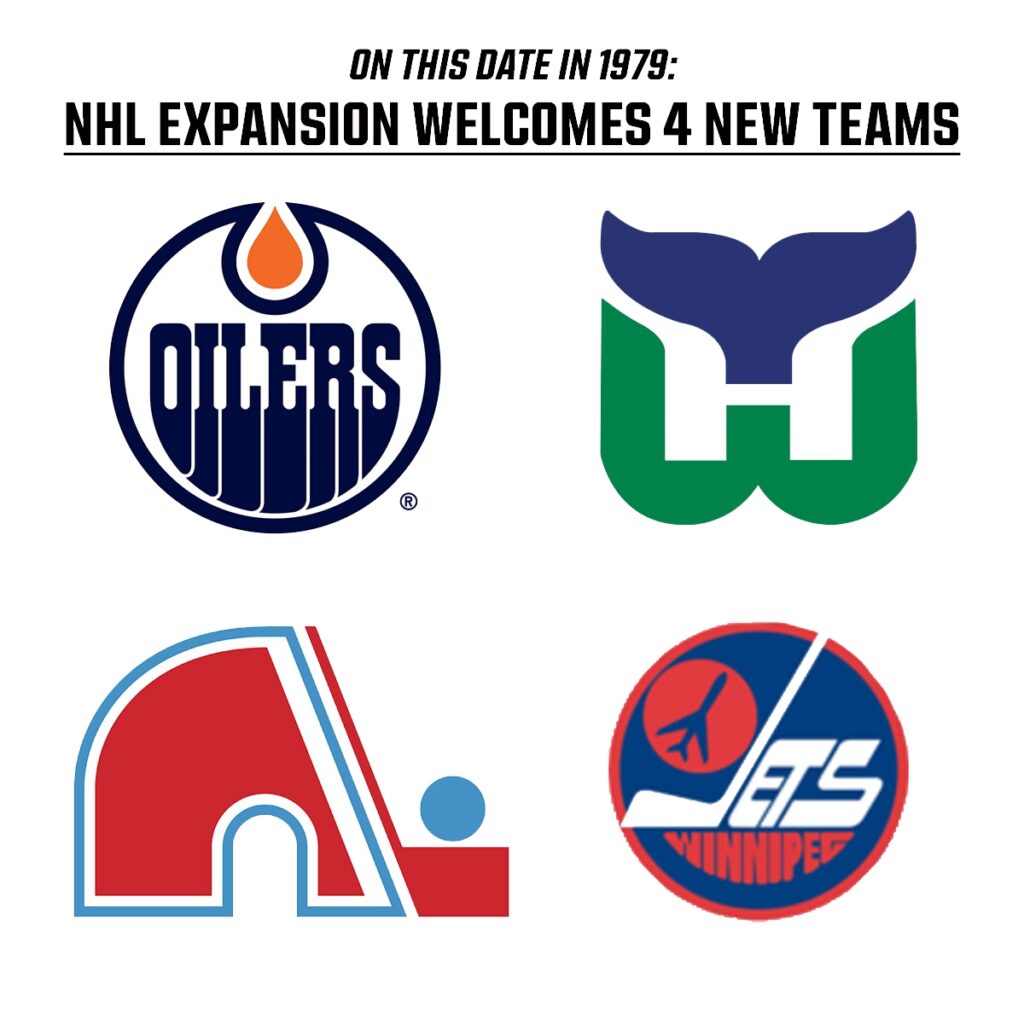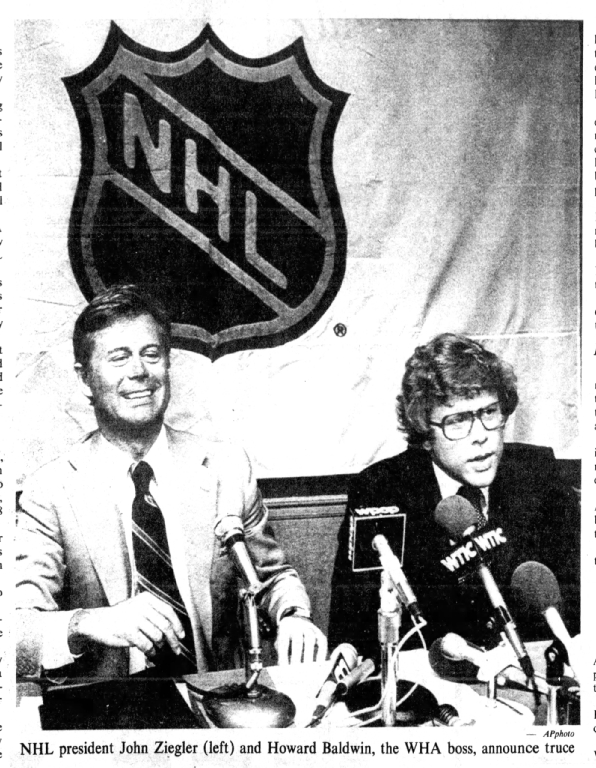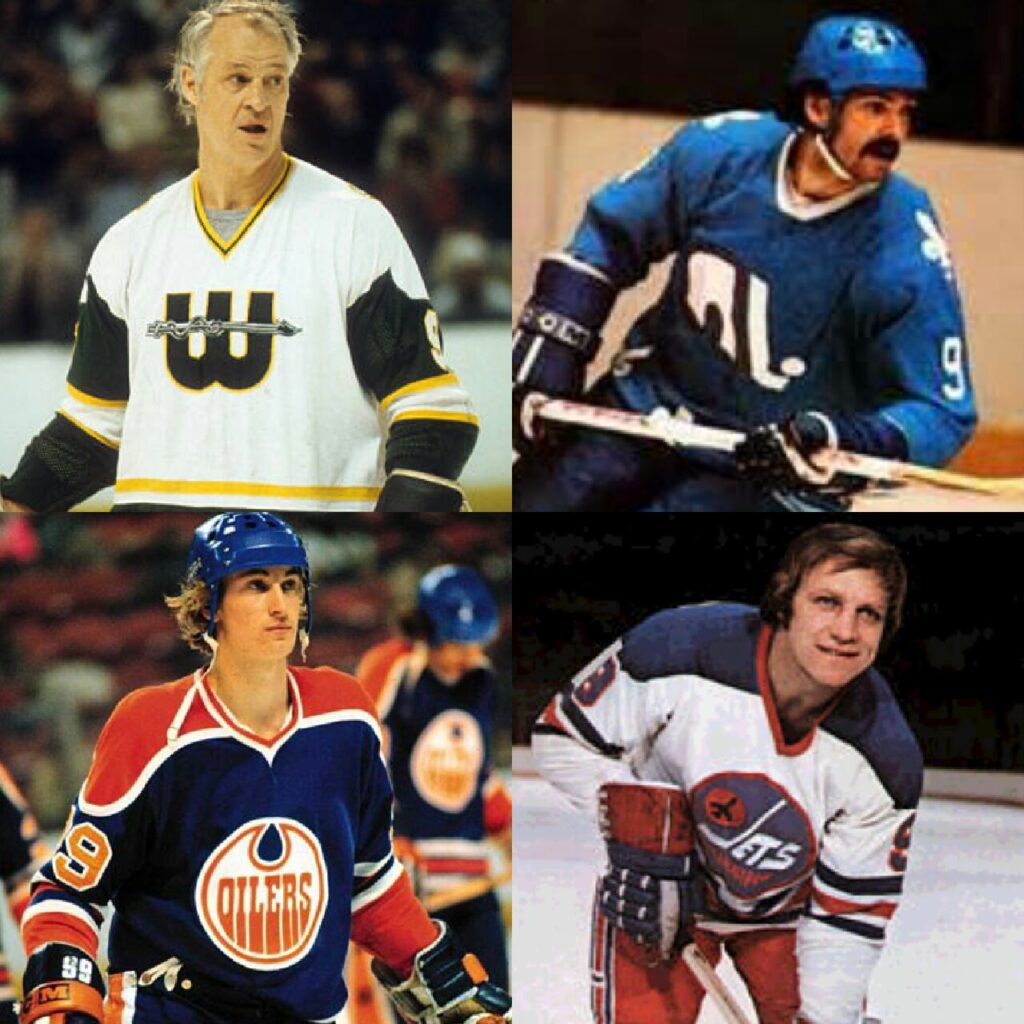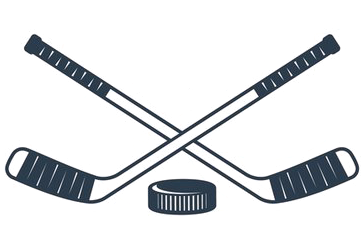
NHL, WHA wed for better or worse
By Al Colletti Canadian Press staff writer
31 Mar 1979, Sat The Ottawa Citizen (Ottawa, Ontario, Canada)
NEW YORK — Some call it expansion and others a mini-merger, but whatever terminology is used, the National Hockey League and the World Hockey Association are wedded for better or for worse.
The decision to admit four of the six remaining WHA clubs as NHL members next season was completed Friday when the NHL's board of governors voted 14 to 3 for a 21-team combined league still divided into four divisions.
The pro-expansionists were in full force in and out of the meetings in New York where owner Harold Ballard of Toronto Maple Leafs was the most vocal minority dissenter.
Ballard, who has voted against taking in the WHA ever since the idea was first broached, said the new members were getting a bum deal because the NHL owners were stripping them of talent.
But President John Ziegler of the NHL and others denied that was the case, claiming the new franchises have a better chance of putting together stronger teams than the poor expansion clubs did when they first started.
Ballard said he personally felt the new agreement was in fact an amalgamation of the two leagues and not an expansion. Governors of Boston Bruins and Los Angeles Kings also took views opposite to those of Ziegler and NHL lawyers in voting against expansion.

Expansion or merger?
The emphasis from Ziegler, one of the architects, was that acceptance of Quebec Nordiques, Edmonton Oilers, Winnipeg Jets and New England Whalers into the NHL was strictly expansion legally and formally.
the fifth since the original expansion in the 1967-68 season.
“Clearly, this is an expansion,” said Peter O'Malley, general counsel of Washington Capitals and alternate governor and member of the expansion committee.
“The WHA is still in existence. If they want to go and issue some franchises, they're free to do it.
“What we have done is accepted in the membership four teams which have previously played in the WHA but we did not collapse the WHA.”
The WHA was only a glimmer in the eye of Gary Davidson, the California promoter who never saw a hockey game before he and Dennis Murphy got together in 1971 to formulate plans for a second major hockey league.
In 1968, they had been successful in forming the American Basketball Association, later absorbed by the National Basketball Association in much the same fashion as the NHL is doing with the WHA.
On Oct. 11, 1972, the WHA began its first season with 300 players signed, many of them from the NHL lured by huge salaries, and 12 teams split into two divisions.
For seven years, the WHA and the NHL were locked in a costly hockey war, skyrocketing salaries and dilution of talent that weakened the structure of the NHL.
But the WHA, often switching franchises and folding many of them along the way, went from a high of 15 clubs to just six in its last season.
The agreement was of particular satisfaction to Bill Jennings, president of the Rangers, who initiated secret merger talks in 1973 without the knowledge of then president Clarence Campbell and was severely reprimanded.
“I am very pleased,” Jennings said. “This is nailed down here. We have to work out an arrangement with the players but I'm hopeful on that.”
Jennings estimated that between 1973 and now, the hockey war cost both leagues “well over $100 million.”
“This is a smart time to do it (expansion) and a good time to do it,” Jennings said. “Lei's hope it's done.”
At the time Jennings first initiated talks, the WHA was hoping to get seven or eight teams into the NHL when franchise costs were only $2 million compared with today's $6 million.

WHA against the NHL was boiling with the WHA seeking $50 million in damages, alleging that the
NHL was in reality a hockey monopoly acting in restraint of trade.
The two sides settled out of court in 1974, with the NHL paying the WHA $1.7 million for legal fees.
A major question is whether the latest action by the NHL in accepting the four WHA clubs was brought about by a new threat of anti-trust action because the WHA was being forced to go out of business, unable to seek relief from the NHL through expansion.
WHA president Howard Baldwin, backed by the huge Aetna insurance interests, said that while the league had its problems it could have continued another year.
But with six teams, it would have been difficult for any failing business to continue to operate under that small lineup. Thus there was the risk of a merger being forced upon the NHL and with no competition existing, the risk of another anti-trust lawsuit.
What they're saying about ‘War Now Peace” Hockey Saga

The NHL-WHA talks have been going on for the last 3 1/2 years, off and on, and the governors — until their last two meetings — always managed to kill expansion or merger between the two leagues even as late as in early March at a meeting in North Key Largo, Fla,
But after strong pressures from the Canadian government, parliament, and city and club officials worried about the future of the Canadian WHA franchises if the league folded, the NHL met in Chicago last week to adopt its expansion committee's report but left open for modification some parts of the 30-page document.
The governors approved them on Friday, leaving May 1 as the date when the incoming WHA teams must post $4,625,000 each when the franchises will be issued.
O'Malley said the switch of Washington from the Norris to the Patrick Division was the main change that was not in the original document.
An expansion draft will be held after the amateur draft during the week of June 11, with each NHL team protecting 15 skaters and two goalies.
Priority selection
After the NHL teams reclaim WHA players whose rights they retain, the four new teams may by priority selection retain two skaters and two goalies from the list of reclaimed players. No first-year pros are affected.
But there are a lot of restrictions for the NHLers in the entire setup, leaving the WHA clubs with a much better chance to negotiate for players than generally believed.
O'Malley and general manager Cliff Fletcher of Atlanta Flames said the incoming franchises would be stronger than their own expansion teams when they entered in the early 1970s.
“I think the incoming expansion teams are competitively superior,” said O'Malley.
How they line up for 1979-80
Wales Conference
Norris Division
- New England
- Montreal
- Pittsburgh
- Los Angeles
- Detroit
Adams Division
- Quebec
- Boston
- Buffalo
- Toronto
- Minnesota
Campbell Conference
Patrick Division
- Washington
- NY Islanders
- NY Rangers
- Philadelphia
- Atlanta
Smythe Division
- Winnipeg
- Edmonton
- Chicago
- Colorado
- St. Louis
The Departed
NEW YORK (AP) — Though the World Hockey Association will complete its regular season and playoffs, only four of its current six teams will join the National Hockey League next season.
The demise of Cincinnati Stingers and Birmingham Bulls would raise to 26 the number of WHA franchises which have come and goqe.
For the trivia-minded, here is a list of departed WHA franchises:
Cincinnati Stingers.
Birmingham Bulls.
Indianapolis Racers.
Minnesota Fighting Saints.
“New” Minnesota Fighting Saints.
Vancouver Blazers.
Philadelphia Blazers.
Jersey Knights.
New York Golden Blades.
New York Raiders.
Ottawa Civics.
Ottawa Nationals.
Toronto Toros.
Houston Aeros.
San Diego Mariners.
Phoenix Roadrunners.
Los Angeles Sharks.
Michigan Stags.
Baltimore Blades.
Calgary Cowboys.
Denver Spurs.
Cleveland Crusaders.
Chicago Cougars.
Miami Screaming Eagles.
Dayton (Ohio) Gems.
San Francisco.
